|
Most equity indexes followed here were down last week as investors fretted over the strength and speed of the economic recovery, especially in the United States. With little new economic data, results were magnified as the month of September and the third quarter wind down. Investors scaled back purchases in the run up to the Federal Reserve Open Market Committee announcement on Wednesday as is usually the case. There were two reactions to the FOMC announcement — positive at first and then not so positive later as analysts parsed the statement in depth. There was also lots of rhetoric emanating from meetings of global leaders at both the United Nations and in the prelude to the Group of 20 meeting in Pittsburgh.
The Federal Reserve said it would begin to scale back short-term cash auctions early next year. The European Central Bank, the Swiss National Bank, and the Bank of England also said they would curtail steps taken to ensure dollar liquidity. The coordinated moves suggest that the central banks feel the financial sector crisis is largely over. However it is important to note that these moves do not drain liquidity.
The Fed left interest rates on hold and pledged to keep them at record lows for an “extended period.” The Fed also said that it would slow the pace of its purchases of mortgage-backed securities, ending the $1,500 billion program three months later than scheduled. It added that the economy was recovering after a “severe downturn,” although it warned that household spending, while apparently stabilizing, remains constrained by continuing job losses and sluggish income growth among other factors.
A major early announcement from the ongoing G20 meetings is that the Group of Seven will be permanently replaced as a global forum for economic policy by the much broader Group of 20. The move highlights the growing economic importance of Asia and some Latin American countries, particularly since the U.S. and many European countries have found their banking systems crippled by an economic crisis originating in excesses in the American mortgage market.
|
|
2008 |
2009 |
% Change |
|
Index |
Dec 31 |
Sep 18 |
Sep 25 |
Week |
Year |
| Asia |
|
|
|
|
|
|
| Australia |
All Ordinaries |
3659.3 |
4693.7 |
4714.8 |
0.4% |
28.8% |
| Japan |
Nikkei 225 |
8859.6 |
10370.5 |
10266.0 |
-1.0% |
15.9% |
|
Topix |
859.2 |
939.4 |
922.7 |
-1.8% |
7.4% |
| Hong Kong |
Hang Seng |
14387.5 |
21623.5 |
21024.4 |
-2.8% |
46.1% |
| S. Korea |
Kospi |
1124.5 |
1699.7 |
1691.5 |
-0.5% |
50.4% |
| Singapore |
STI |
1761.6 |
2647.9 |
2662.8 |
0.6% |
51.2% |
| China |
Shanghai Composite |
1820.8 |
2962.7 |
2838.8 |
-4.2% |
55.9% |
|
|
|
|
|
|
|
| India |
Sensex 30 |
9647.3 |
16741.3 |
16693.0 |
-0.3% |
73.0% |
| Indonesia |
Jakarta Composite |
1355.4 |
2457.0 |
2444.6 |
-0.5% |
80.4% |
| Malaysia |
KLCI |
876.8 |
1221.2 |
1217.4 |
-0.3% |
38.9% |
| Philippines |
PSEi |
1872.9 |
2789.3 |
2821.3 |
1.1% |
50.6% |
| Taiwan |
Taiex |
4591.2 |
7526.6 |
7345.2 |
-2.4% |
60.0% |
| Thailand |
SET |
450.0 |
713.7 |
721.6 |
1.1% |
60.4% |
|
|
|
|
|
|
|
| Europe |
|
|
|
|
|
|
| UK |
FTSE 100 |
4434.2 |
5172.9 |
5082.2 |
-1.8% |
14.6% |
| France |
CAC |
3218.0 |
3827.8 |
3739.1 |
-2.3% |
16.2% |
| Germany |
XETRA DAX |
4810.2 |
5703.8 |
5581.4 |
-2.1% |
16.0% |
|
|
|
|
|
|
|
| North America |
|
|
|
|
|
|
| United States |
Dow |
8776.4 |
9820.2 |
9665.2 |
-1.6% |
10.1% |
|
NASDAQ |
1577.0 |
2132.9 |
2090.9 |
-2.0% |
32.6% |
|
S&P 500 |
903.3 |
1068.3 |
1044.4 |
-2.2% |
15.6% |
| Canada |
S&P/TSX Comp. |
8987.7 |
11446.0 |
11212.4 |
-2.0% |
24.8% |
| Mexico |
Bolsa |
22380.3 |
29942.0 |
28760.0 |
-3.9% |
28.5% |
 Equities in the UK and Europe were down last week mainly on growth concerns. But with the end of the quarter at hand, many investors took profits as they decided that it's time to assess the equity rally that began last March. Investors became jittery as U.S. economic data did not live up to expectations and central banks began to announce plans to wind down some of the programs they had been using to improve liquidity. The CAC and DAX were down four of five trading days, while the FTSE was down three of five. Even though the German Ifo survey continued to climb for the sixth consecutive month and reached a 12 month high, it missed forecast estimates. And in the EMU, M3 money supply growth continued to weaken, mainly on weak lending. Equities in the UK and Europe were down last week mainly on growth concerns. But with the end of the quarter at hand, many investors took profits as they decided that it's time to assess the equity rally that began last March. Investors became jittery as U.S. economic data did not live up to expectations and central banks began to announce plans to wind down some of the programs they had been using to improve liquidity. The CAC and DAX were down four of five trading days, while the FTSE was down three of five. Even though the German Ifo survey continued to climb for the sixth consecutive month and reached a 12 month high, it missed forecast estimates. And in the EMU, M3 money supply growth continued to weaken, mainly on weak lending.
Some analysts think that investors have decided that it is time to pause for reflection after the gains over the past five months. Even though central bankers have been slightly more upbeat, they continue to remain cautious on their outlook for inflation. And they are not expecting a sharp bounce in economic activity. The results strengthen the European Central Bank’s view that the eurozone’s economic recovery remains highly fragile. In short there is a lot of uncertainty. Eurozone economic activity contracted faster than in the U.S. and UK at the end of last year and in the first quarter of 2009, as its exporters reeled from the loss of global confidence in the wake of the collapse of Lehman Brothers. But the eurozone appears to have recovered more quickly — in part because consumers were less indebted and less affected by tumbling house prices.
Bank of England minutes
There were no surprises in the minutes of the Bank of England’s monetary policy committee meeting. They confirmed an expected unanimous vote in favor of leaving bank rate at 0.5 percent rate as well as the retention of the £175 billion cap on the quantitative easing (QE) portfolio. The current ceiling is expected to be reached within a couple of months. Otherwise the minutes showed that while the MPC saw plenty of spare capacity in the economy, they also anticipate slightly higher short term inflation than expected in August.
The Bank left the door open to a further expansion of quantitative easing even though they said that the economy could be at the start of “virtuous upward spiral.” But the Bank made clear that any decision on altering the amount of quantitative easing is highly unlikely to be made until more comprehensive forecasts are available ahead of its November inflation report.
It acknowledged that the world economy had improved by more than expected over the previous month. Asset prices had continued to rise while three-month Libor — the rate at which banks lend to each other and a benchmark for loans to consumers and companies — was at its lowest level since the mid-1980s. But despite the general improvement in the economic outlook that has consistently surprised the committee in recent months, it remained downbeat.
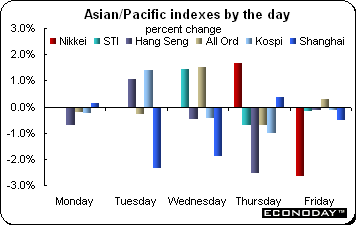 Most Asian/Pacific equity indexes were down in a holiday-laden week. The exceptions were the All Ordinaries (up 0.5 percent), STI (up 0.6 percent), SET (up 1.1 percent) and the PSEi (up 1.1 percent). Taking their cues from U.S. equities, Asian investors were concerned about the pace of the economic recovery. Traders also preferred to stay on the sidelines while they awaited the outcome of the G20 meeting. Investors are also watching policy moves by the new Japanese government very closely. Most Asian/Pacific equity indexes were down in a holiday-laden week. The exceptions were the All Ordinaries (up 0.5 percent), STI (up 0.6 percent), SET (up 1.1 percent) and the PSEi (up 1.1 percent). Taking their cues from U.S. equities, Asian investors were concerned about the pace of the economic recovery. Traders also preferred to stay on the sidelines while they awaited the outcome of the G20 meeting. Investors are also watching policy moves by the new Japanese government very closely.
In Japan where markets were closed for three days, the Nikkei was down 1 percent while the Topix swooned by 1.8 percent on the week. While up on Thursday, they were battered on Friday by Nomura Holdings Inc.'s announcement of a second round of massive public share offerings. And investors were jittery on concerns that the new government might impose stricter capital standards on the banking sector. This was compounded by a new Cabinet minister's call for a moratorium on loan repayments adding more pressure on the banking sector. An additional worry was the growing uncertainty over the rehabilitation of Japan Airlines. The government was asked for a bailout but was dissatisfied with JAL’s restructuring plan and launched a new task force to push through more drastic measures.
The Bank of Japan released the minutes of its August 10 to 11 meeting. They revealed that the monetary policy board members expressed confidence that the economy was finally starting to show signs of bottoming out. "Financial conditions, while remaining generally tight, had continued to show signs of improvement," the minutes said.
The Reserve Bank of Australia released its semi-annual Financial Stability Review. In it, the RBA noted that the Australian financial system had remained resilient throughout the crisis period owing to a combination of factors, such as the mild nature of the overall economic slowdown in Australia, the lack of large-scale exposure to structured securities and conservative lending practices — particularly in the case of housing. The central bank also noted that though the conditions in the global financial system have "improved significantly" in the last six months, the situation still remains challenging.
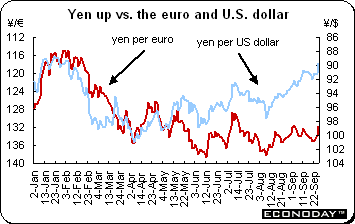 The yen climbed above the ¥90 to a U.S. dollar on Friday for the first time since early February as Japan’s new finance minister Hirohisa Fujii reiterated opposition to intervention in currency markets. The currency was up against all of its 16 most-traded counterparts. Fujii, whose party won elections promising to boost consumers’ purchasing power, said that he did not support a weak yen. The comments suggested a change from the Liberal Democratic Party, which ruled for most of the past 55 years supporting the exporters that led growth. The yen climbed above the ¥90 to a U.S. dollar on Friday for the first time since early February as Japan’s new finance minister Hirohisa Fujii reiterated opposition to intervention in currency markets. The currency was up against all of its 16 most-traded counterparts. Fujii, whose party won elections promising to boost consumers’ purchasing power, said that he did not support a weak yen. The comments suggested a change from the Liberal Democratic Party, which ruled for most of the past 55 years supporting the exporters that led growth.
Japan’s exporters are in danger of being left behind by a global trade recovery as the change in government ushers in a tolerance for exchange rate gains that threaten to erode their profits. Japanese exports fell 36 percent in August from a year earlier for an 11th straight decline. The drop was exacerbated by the yen’s surge against the dollar in the past year, which are making Japanese goods more expensive abroad and hurting the value of repatriated earnings.
 At the same time, the pound sterling dropped to a three month low below $1.60 to a pound after Bank of England governor Mervyn King said sterling’s weakness is aiding in rebalancing the UK’s economy. The euro continued its assault on the struggling pound, extending a four-month high. The euro has been trending notably higher for about two weeks. Sterling dropped to a fresh five-month low against the euro after traders took King’s comments to mean the BoE was comfortable with a weaker pound. At the same time, the pound sterling dropped to a three month low below $1.60 to a pound after Bank of England governor Mervyn King said sterling’s weakness is aiding in rebalancing the UK’s economy. The euro continued its assault on the struggling pound, extending a four-month high. The euro has been trending notably higher for about two weeks. Sterling dropped to a fresh five-month low against the euro after traders took King’s comments to mean the BoE was comfortable with a weaker pound.
Selected currencies — weekly results
|
|
2008 |
2009 |
% change |
|
|
Dec 31 |
Sep 18 |
Sep 25 |
Week |
2009 |
| U.S. $ per currency |
|
|
|
|
|
|
| Australia |
A$ |
0.711 |
0.867 |
0.866 |
-0.1% |
21.7% |
| New Zealand |
NZ$ |
0.587 |
0.708 |
0.717 |
1.4% |
22.1% |
| Canada |
C$ |
0.822 |
0.935 |
0.916 |
-2.0% |
11.5% |
| Eurozone |
euro (€) |
1.397 |
1.470 |
1.467 |
-0.2% |
5.0% |
| UK |
pound sterling (£) |
1.459 |
1.624 |
1.593 |
-1.9% |
9.2% |
|
|
|
|
|
|
|
| Currency per U.S. $ |
|
|
|
|
|
|
| China |
yuan |
6.826 |
6.828 |
6.829 |
0.0% |
0.0% |
| Hong Kong |
HK$* |
7.750 |
7.751 |
7.750 |
0.0% |
0.0% |
| India |
rupee |
48.675 |
48.142 |
47.986 |
0.3% |
1.4% |
| Japan |
yen |
90.740 |
91.430 |
89.830 |
1.8% |
1.0% |
| Malaysia |
ringgit |
3.453 |
3.479 |
3.470 |
0.3% |
-0.5% |
| Singapore |
Singapore $ |
1.433 |
1.415 |
1.416 |
-0.1% |
1.2% |
| South Korea |
won |
1259.550 |
1207.800 |
1186.000 |
1.8% |
6.2% |
| Taiwan |
Taiwan $ |
32.820 |
32.443 |
32.425 |
0.1% |
1.2% |
| Thailand |
baht |
34.753 |
33.705 |
33.570 |
0.4% |
3.5% |
| Switzerland |
Swiss franc |
1.066 |
1.031 |
1.029 |
0.1% |
3.6% |
| *Pegged to U.S. dollar |
|
|
|
|
|
|
| Source: Bloomberg |
|
|
|
|
|
|
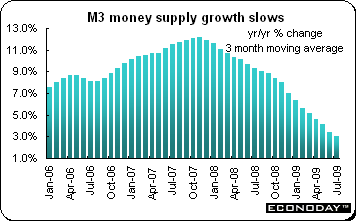 M3 money supply for the three months ending in August eased to a new record low of 3.0 percent, down from 3.4 percent in July. For August only, M3 growth was just 2.5 percent on the year. In keeping with previous months, the latest slowdown was attributable to weak borrowing. Annual credit growth extended to the private sector dropped 0.7 percentage points to 1.1 percent, within which lending declined to just 0.1 percent from 0.7 percent in July. At the same time loans to non-financial corporations slipped 0.9 percentage points to a 0.7 percent annual rate and on the same basis, lending to households was down 0.2 percent after a flat reading last time. M3 money supply for the three months ending in August eased to a new record low of 3.0 percent, down from 3.4 percent in July. For August only, M3 growth was just 2.5 percent on the year. In keeping with previous months, the latest slowdown was attributable to weak borrowing. Annual credit growth extended to the private sector dropped 0.7 percentage points to 1.1 percent, within which lending declined to just 0.1 percent from 0.7 percent in July. At the same time loans to non-financial corporations slipped 0.9 percentage points to a 0.7 percent annual rate and on the same basis, lending to households was down 0.2 percent after a flat reading last time.
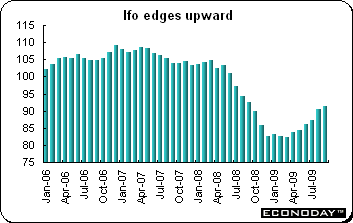 Ifo business sentiment climbed to 91.3 from 90.5. Both current conditions and expectations were up with the former gaining 0.8 points to 87.0 and the latter up 0.7 points to 95.7. With the exception of construction, morale strengthened in all sectors. The largest rise was recorded in retail (2.5 points to minus 12.4) closely followed by services (2.4 points to 3.8). Confidence in manufacturing climbed 2 points to minus 19.9 while wholesale was up 2.3 points to minus 12.2. By contrast, sentiment in construction slipped 1.7 points minus 25.7. Ifo business sentiment climbed to 91.3 from 90.5. Both current conditions and expectations were up with the former gaining 0.8 points to 87.0 and the latter up 0.7 points to 95.7. With the exception of construction, morale strengthened in all sectors. The largest rise was recorded in retail (2.5 points to minus 12.4) closely followed by services (2.4 points to 3.8). Confidence in manufacturing climbed 2 points to minus 19.9 while wholesale was up 2.3 points to minus 12.2. By contrast, sentiment in construction slipped 1.7 points minus 25.7.
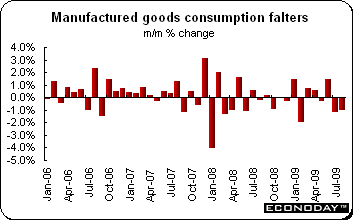 August household spending on manufactured goods dropped 1.0 percent following a 1.2 percent decline in July. On-the-year spending is down 1.3 percent. The decline was broadly based and led by textiles which slumped 3.8 percent on the month having already nose dived 3.8 percent and 3.0 percent in June and July respectively. The auto sector fared little better with purchases down 1.2 percent while overall durable goods sales were off 0.7 percent. Excluding the auto sector, consumption fell 1.4 percent. Household goods saw demand decline a relatively modest 0.2 percent. August household spending on manufactured goods dropped 1.0 percent following a 1.2 percent decline in July. On-the-year spending is down 1.3 percent. The decline was broadly based and led by textiles which slumped 3.8 percent on the month having already nose dived 3.8 percent and 3.0 percent in June and July respectively. The auto sector fared little better with purchases down 1.2 percent while overall durable goods sales were off 0.7 percent. Excluding the auto sector, consumption fell 1.4 percent. Household goods saw demand decline a relatively modest 0.2 percent.
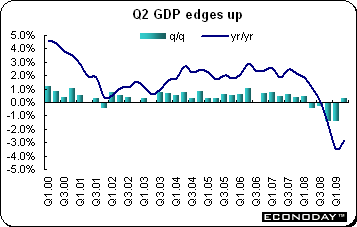 Final estimate of second quarter gross domestic product was up 0.3 percent but was down 2.8 percent when compared with the same quarter a year ago. Final demand was up 0.9 percent thanks to a sharp improvement in the foreign trade sector. Here exports rose 0.7 percent which, combined with a 2.1 percent slump in imports, contributed fully 0.8 percentage points to the bottom line. However, domestic demand was much less robust. Household consumption crept up just 0.2 percent while capital investment dropped 0.9 percent on top of the 2.5 percent slump seen at the start of the year. Business investment was down 0.7 percent while household capital spending dropped 1.8 percent. Consequently it was left to the public sector (0.6 percent) to post the most significant advance. Final estimate of second quarter gross domestic product was up 0.3 percent but was down 2.8 percent when compared with the same quarter a year ago. Final demand was up 0.9 percent thanks to a sharp improvement in the foreign trade sector. Here exports rose 0.7 percent which, combined with a 2.1 percent slump in imports, contributed fully 0.8 percentage points to the bottom line. However, domestic demand was much less robust. Household consumption crept up just 0.2 percent while capital investment dropped 0.9 percent on top of the 2.5 percent slump seen at the start of the year. Business investment was down 0.7 percent while household capital spending dropped 1.8 percent. Consequently it was left to the public sector (0.6 percent) to post the most significant advance.
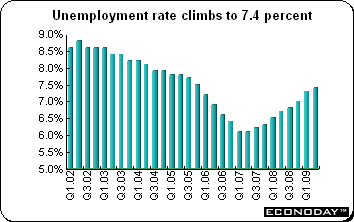 Second quarter seasonally adjusted unemployment rate edged up 0.1 percent to 7.4 percent which is a three year high. The unadjusted unemployment rate was also 7.4 percent last quarter, up from 6.7 percent in the same three months a year ago. Some 434,000 jobs were lost over the period, mainly in the weaker southern regions. The employment rate declined over the year by 1.3 percentage points to 57.9 percent with the number of jobseekers rising 8.1 percent or 137,000. Second quarter seasonally adjusted unemployment rate edged up 0.1 percent to 7.4 percent which is a three year high. The unadjusted unemployment rate was also 7.4 percent last quarter, up from 6.7 percent in the same three months a year ago. Some 434,000 jobs were lost over the period, mainly in the weaker southern regions. The employment rate declined over the year by 1.3 percentage points to 57.9 percent with the number of jobseekers rising 8.1 percent or 137,000.
 July seasonally adjusted merchandise trade balance swung back into a €1.1B surplus following a smaller revised €0.3B shortfall in June. This was the first surplus in 2009. Exports were up 3.1 percent on the month while imports declined 2.8 percent. On the year, all the main export categories saw substantial drops. Consumer goods dropped 10.8 percent with durables down 19.0 percent, while capital goods slumped 22.3 percent and intermediates swooned 24.5 percent. Energy exports nosedived 38.5 percent. The import picture was little different with consumer goods down 5.5 percent, capital goods off 27.2 percent, intermediates 32.5 percent weaker and energy purchases down 22.5 percent. On an unadjusted basis, the trade surplus was €4.1 billion. July seasonally adjusted merchandise trade balance swung back into a €1.1B surplus following a smaller revised €0.3B shortfall in June. This was the first surplus in 2009. Exports were up 3.1 percent on the month while imports declined 2.8 percent. On the year, all the main export categories saw substantial drops. Consumer goods dropped 10.8 percent with durables down 19.0 percent, while capital goods slumped 22.3 percent and intermediates swooned 24.5 percent. Energy exports nosedived 38.5 percent. The import picture was little different with consumer goods down 5.5 percent, capital goods off 27.2 percent, intermediates 32.5 percent weaker and energy purchases down 22.5 percent. On an unadjusted basis, the trade surplus was €4.1 billion.
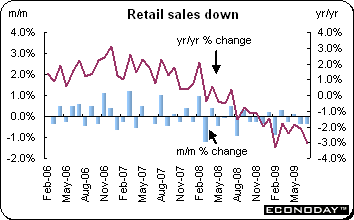 July retail sales dropped 0.4 percent and were down 2.6 percent when compared with last year. Both food and non-food sectors dropped 0.4 percent on the month. On the year, food sales were down 2.1 percent while in aggregate, other areas saw demand decline 2.8 percent. Within the non-food group, annual sales were particularly soft in books & paper products (down 3.0 percent), hardware & household goods (down 3.0 percent) and clothing & shoes (down 2.8 percent). July retail sales dropped 0.4 percent and were down 2.6 percent when compared with last year. Both food and non-food sectors dropped 0.4 percent on the month. On the year, food sales were down 2.1 percent while in aggregate, other areas saw demand decline 2.8 percent. Within the non-food group, annual sales were particularly soft in books & paper products (down 3.0 percent), hardware & household goods (down 3.0 percent) and clothing & shoes (down 2.8 percent).
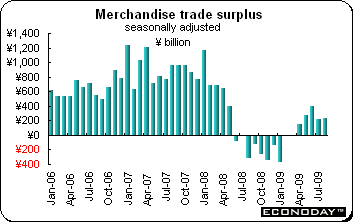 August unadjusted merchandise trade surplus was ¥185.7 billion. Exports were down 36 percent on the year and are now down 11 months in a row while imports dropped 41.3 percent for their 10th consecutive monthly decline. Exports to the U.S. are down 34.4 percent on the year and have now dropped 24 months in a row. Exports to the EU which have dropped for 13 months were down 45.9 percent on the year while exports to Asia – down for 11 months – dropped 30.6 percent. On a seasonally adjusted basis, the trade surplus was ¥235.4 billion. Exports edged down by 0.7 percent on the month while imports dropped 1.0 percent. August unadjusted merchandise trade surplus was ¥185.7 billion. Exports were down 36 percent on the year and are now down 11 months in a row while imports dropped 41.3 percent for their 10th consecutive monthly decline. Exports to the U.S. are down 34.4 percent on the year and have now dropped 24 months in a row. Exports to the EU which have dropped for 13 months were down 45.9 percent on the year while exports to Asia – down for 11 months – dropped 30.6 percent. On a seasonally adjusted basis, the trade surplus was ¥235.4 billion. Exports edged down by 0.7 percent on the month while imports dropped 1.0 percent.
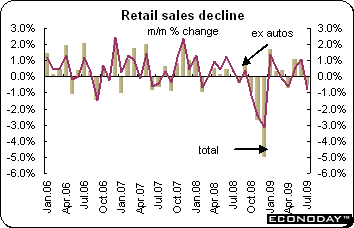 July retail sales sank 0.6 percent and are now 4.9 percent below their year ago level. The monthly drop was largely a function of falling prices since volumes were off just 0.1 percent. Retail sales excluding autos dropped 1.0 percent and were down 4.7 percent on the year. The auto sector once again had an important impact upon the headline figures. The decline was driven by a 3.4 percent drop in gasoline station sales, which in turn reflected lower pump prices. This was the third time in the last four months that gasoline sales have had the largest single effect on the total. However the auto sector also saw new car demand edge up 0.2 percent, their third consecutive monthly gain. Among the other major categories, home furnishings & electrical goods were down 0.6 percent while food & beverages dropped 1.5 percent. Other declines were seen in clothing (0.5 percent) and in the miscellaneous retailers' category (0.4 percent). Weakness in these categories more than offset monthly increases in building & outdoor home supplies (1.0 percent), pharmacies & personal care (1.1 percent) and general merchandise (0.6 percent). July retail sales sank 0.6 percent and are now 4.9 percent below their year ago level. The monthly drop was largely a function of falling prices since volumes were off just 0.1 percent. Retail sales excluding autos dropped 1.0 percent and were down 4.7 percent on the year. The auto sector once again had an important impact upon the headline figures. The decline was driven by a 3.4 percent drop in gasoline station sales, which in turn reflected lower pump prices. This was the third time in the last four months that gasoline sales have had the largest single effect on the total. However the auto sector also saw new car demand edge up 0.2 percent, their third consecutive monthly gain. Among the other major categories, home furnishings & electrical goods were down 0.6 percent while food & beverages dropped 1.5 percent. Other declines were seen in clothing (0.5 percent) and in the miscellaneous retailers' category (0.4 percent). Weakness in these categories more than offset monthly increases in building & outdoor home supplies (1.0 percent), pharmacies & personal care (1.1 percent) and general merchandise (0.6 percent).
The FOMC meeting announcement Wednesday combined with focus on potential pronouncements from the G20 meeting garnered the most attention last week. However, investors did not ignore economic reports which were mixed. Equities paused in their rally while the yen soared and sterling sank. The euro, sterling and the Canadian and Australian dollars were down against their U.S. counterpart.
The German national election takes place Sunday. Angela Merkel is expected to win reelection. This week sees the end of the third quarter. And there will be the usual outpouring of economic news. And investors will prepare themselves for another earnings season.
| The following indicators will be released this week... |
| Europe |
|
|
| September 28 |
EMU |
Retail Sales (August) |
| September 29 |
EU |
Business and Consumer Confidence (September) |
|
UK |
Gross Domestic Product (Q2.2009 final) |
| September 30 |
EMU |
Harmonized Index of Consumer Prices (September, flash) |
|
Germany |
Unemployment (September) |
|
France |
Producer Price Index (August) |
|
Italy |
Producer Price Index (August) |
| October 1 |
EMU |
Markit Manufacturing PMI (September) |
|
|
Unemployment (August) |
| October 2 |
EMU |
Producer Price Index (August) |
|
|
|
| Asia/Pacific |
|
|
| September 29 |
Japan |
Consumer Price Index (August, September) |
| September 30 |
Japan |
Industrial Production (August) |
|
Australia |
Retail Sales (August) |
| October 1 |
Japan |
Tankan Survey (Q3.2009) |
|
|
Retail Sales (August) |
| October 2 |
|
Unemployment (August) |
|
|
Household Spending (August) |
|
|
|
| Americas |
|
|
| September 30 |
Canada |
Monthly Gross Domestic Product (July) |
| ` |
|
Industrial Product Price Index (August) |
|
|
Raw Materials Price Index (August) |
Anne D Picker is the author of International Economic Indicators and Central Banks.
|

